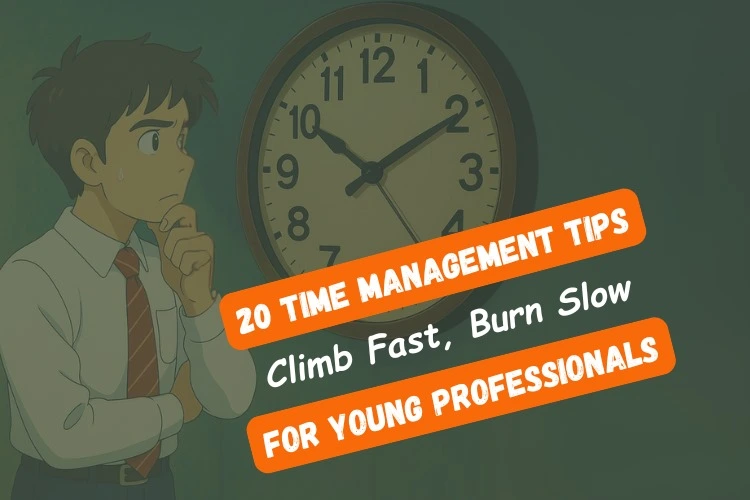In the fast-paced world of a young professional, time is an invaluable resource that many take for granted. We’re often so absorbed in the hustle of daily work, networking, and personal commitments that we overlook the importance of managing the most finite resource we have — time.
As young professionals juggling deadlines, meetings, and personal goals, it often feels like the day ends before it even begins.
Mastering the art of time management is critical to truly advancing in your career while preserving your energy and well-being. With a mindful approach, you can make the most of each hour and continue to grow without burning out.
Here are 20 practical time management tips to help you climb fast but burn slow.
20 Time Management Tips for Young Professionals
- Define your goals, then plan your time—Begin each day by clarifying your top three goals. Time spent without direction is time wasted.
- Prioritize tasks using the Eisenhower Matrix—Categorize tasks into urgent vs. important, and tackle the critical ones first.
- Implement the 80/20 Rule—Focus on the 20% of tasks that yield 80% of the results, and eliminate or delegate the rest.
- Adopt the Two-Minute Rule—If a task can be done in two minutes or less, do it immediately. It clears mental clutter and boosts efficiency.
- Start with high-energy tasks— Tackle the most demanding tasks when your energy is at its peak. Morning hours often offer your best cognitive focus.
- Limit meeting time to optimize productivity— Challenge long meeting formats. Many meetings can be effective in under 30 minutes.
- Learn the art of saying “no” tactfully—Recognize your limits. Protect your time by politely declining requests that don’t align with your priorities.
- Time block your schedule— Instead of a to-do list, block time for each activity. Set aside specific hours for meetings, focused work, and personal tasks.
- Batch similar tasks—Group related activities together (e.g., emails, administrative work) to minimize switching costs and stay focused.
- Avoid multitasking—It can feel productive, but studies show multitasking reduces efficiency. Focus on completing one task before moving on to the next.
- Use the Pomodoro Technique—Work in 25-minute intervals followed by a 5-minute break. This helps sustain focus while preventing burnout.
- Limit distractions—Turn off email notifications, silence your phone, and designate “do not disturb” times for uninterrupted work.
- Automate repetitive tasks—Invest in tools that can automate scheduling, emails, or other administrative tasks to save you time.
- Take scheduled breaks for mental clarity—Short breaks throughout the day help maintain cognitive function and avoid mental fatigue.
- Reflect weekly on your time management—At the end of each week, assess what worked, what didn’t, and adjust your strategies accordingly.
- Establish a nightly ritual—Plan tomorrow today. Set your priorities and prepare for the next day so you can hit the ground running.
- Delegate effectively—Don’t hesitate to delegate tasks that others can handle, allowing you to focus on higher-impact activities.
- Manage your energy, not just your time— Recognize your energy peaks and valleys throughout the day. Schedule demanding tasks during high-energy periods.
- Keep a “Not-to-Do” list—Identify habits or tasks that waste your time (like aimlessly browsing social media) and actively avoid them.
- Create a “time audit”—Track how you’re spending your time for a week to identify patterns of inefficiency and areas of improvement.
Expert Insights: A Quick Q&A with Dr.Varadharajan
Pharma & Social Business Consultant | Professor & Interdisciplinary Scholar
To gain a deeper perspective, we asked Dr.Varadharajan a few crisp but thought-provoking questions on time, productivity, and balance. Here’s what he shared:
- What common daily activity silently consumes the most time?
Post-internet era, checking the phone. - What’s a common time-related mistake young professionals make today?
Both not planning the work and working the plan. - How does saying yes too often damage time management?
Saying yes invites more intrusions and becomes a thoughtless habit and costs time. - How can young adults balance work, health, and leisure more effectively?
By treating all three as sides of the triangle of life and remembering that without one side, it is not a triangle. - How can IT beginners reduce burnout through simple daily changes?
Exercising every day is one of the simplest ways to reduce burnout. - In your view, how much time should young adults dedicate daily to personal growth?
They should integrate personal growth as a factor in everything they do. - Does waking up early truly enhance productivity, or is it overrated?
Never overrated. Waking up early not only enhances productivity, but it also opens up a new world from within. - When did you first realize the direct link between time and productivity?
When I heard an author bureaucrat say, “Luckily, I published this book when I was extremely busy — otherwise, I would have never gotten it done.” - What activity seems unimportant now but becomes valuable over time?
Exercise, dieting, fasting, and unwinding activities. - If you had to compare time management to an object, what would it be and why?
Perishable goods.
Conclusion:
We often behave like time is infinite — like there’s always tomorrow, always later. But the truth is, there isn’t. And the sooner we start respecting our time, the more fulfilling our lives and careers become.
If you’ve ever wished for more hours in a day, here’s your answer: 27 Hours a Day by R. Poornalingam — a practical, pocket-sized reminder that time can be stretched, not by magic, but by mastery. Grab your copy now from KKBooks

